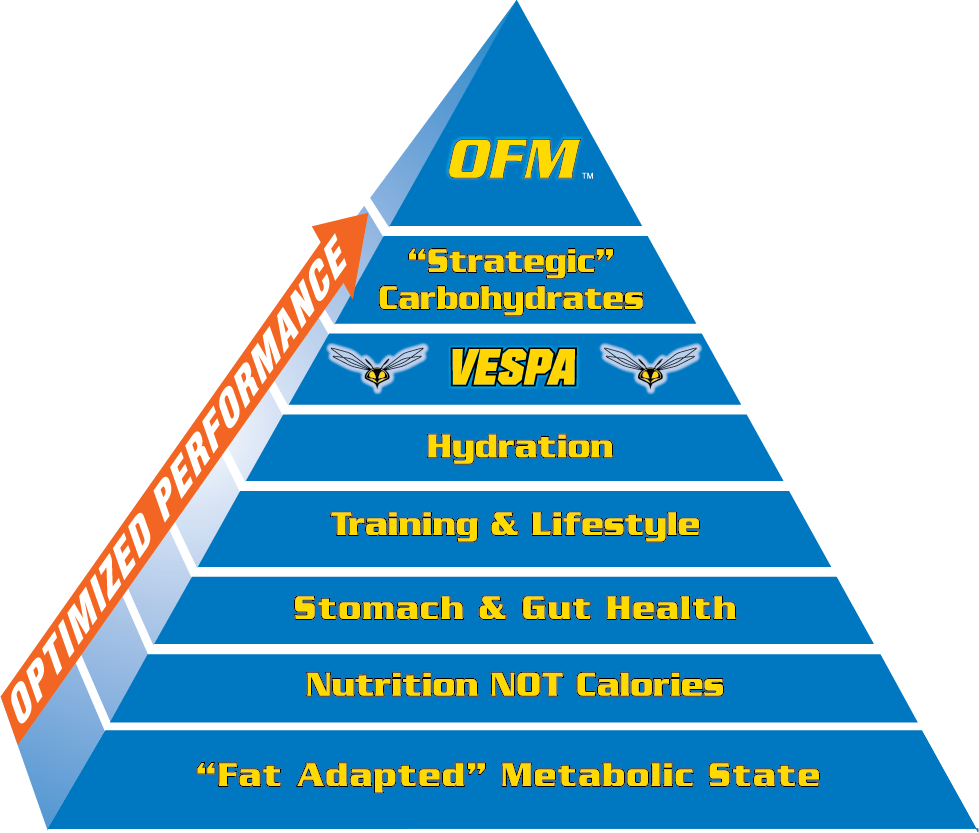Episodes
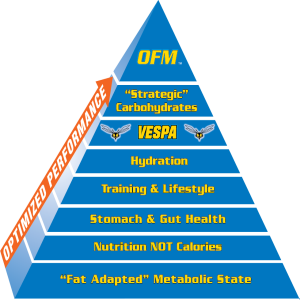
Tuesday Jun 17, 2025
Andrea Moore’s Exploration of Her Performance Envelope
Tuesday Jun 17, 2025
Tuesday Jun 17, 2025
Peter Defty and Andrea Moore get together to discuss shattering boundaries in human health & performance. In early May Andrea completed the Cocodona 250, while a month earlier she completed the inaugural edition of the Arizona Monster 300. Completing both became known as “Monsterdona” with only 6-7 athletes able to complete both of these grueling trail ultras. But the adventure does not end there. As this podcasts drops for public consumption Andrea is finishing up the Tahoe 200 and has plans for another 5 200+ mile trail ultras this season.

Tuesday Apr 15, 2025
Tuesday Apr 15, 2025
In Episode #77 of the OFM podcast, Peter Defty welcomes Dr. Amy Bukszpan, a behavioral analyst and endurance coach, to explore how applied behavioral science can empower athletes to take control of their nutrition, performance, and daily decisions. From breaking carb addictions to reframing failure, they dive into how modifying environmental variables and cultivating curiosity over fear can dramatically improve outcomes both in and outside of competitions. This conversation bridges cutting-edge metabolic performance with real-world psychology for anyone ready to take their performance—and life—to the next level.
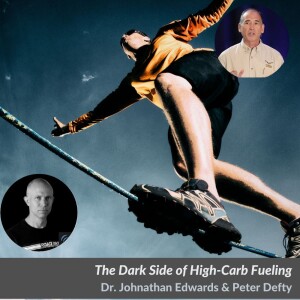
Thursday Mar 20, 2025
Thursday Mar 20, 2025
OFM Podcast Host, Peter Defty sits down with Dr. Johnathan Edwards MD for an in depth and candid conversation on the underlying reality of sports nutrition. With the current hype surrounding high carbohydrate diets and fueling regimens which are dominating the conversation in sports nutrition this is a conversation every athlete needs to listen to inform their journey so they can achieve “Higher Health & Peak Performance”.
Watch the video: Watch the video
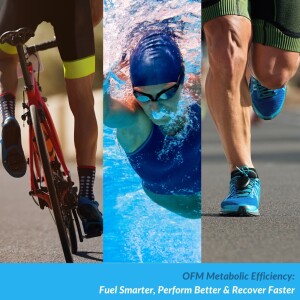
Monday Feb 03, 2025
Monday Feb 03, 2025
Colin’s powerful transformation from an unhealthy lifestyle to becoming an elite age-group triathlete (all while balancing a demanding career, coaching, and family) underscore the importance of performance level metabolic health.
OFM confers metabolic efficiency by building metabolic capacity. Combined with strategic carbohydrate fueling, Colin has unlocked winning performance without compromising health and longevity.
His journey proves that endurance success isn’t predicated upon high-carb fueling—it's about optimizing fat metabolism to establish a robust metabolic foundation then building upon it with strategic nutrition choices. Whether you're a competitive athlete or simply looking to improve your performance, Colin's insights provide a game-changing perspective on fueling for performance and lifelong health.
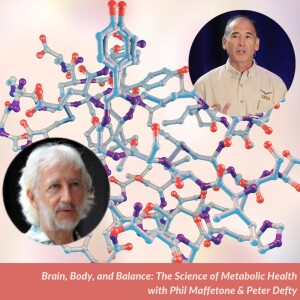
Thursday Dec 26, 2024
Thursday Dec 26, 2024
Main Themes
Holistic Health and Performance
- Host, Peter Defty and Guest, Phil Maffetone discuss developing a holistic approach to health and fitness.
- The impact of refined carbohydrates on body fat, athletic performance, and overall health.
Challenging Conventional Wisdom
- Examining the myths of high-carb fueling and calorie-based diets.
- The negative consequences of corporate influence on health and sports nutrition.
Individualized Health Metrics
- Importance of understanding "N=1" (individual data points) in health and training.
- Utilizing biomarkers like Vitamin D, fasting insulin, triglycerides, and waist-to-height ratio to assess health.
- Learning to tune into ‘the experience’ in conjunction to the biomarkers and metrics
The Power of the Aerobic System
- How building a robust aerobic base enhances fat-burning, endurance, and recovery.
- The risks of over-reliance on sugar for athletic performance.
Societal Impacts on Health and Creativity
- The role of modern diets in declining physical and brain health.
- A parallel between diminishing musical creativity and societal health trends.
Key Takeaways
- Avoid junk food and focus on real, nutrient-dense foods to reset metabolic health.
- If you are addicted to carbohydrates, metabolically resetting then adapting to build metabolic capacity.
- If you are not sure trying the "two-week test" to identify carbohydrate intolerance.
- Optimize training through methods like the MAF test to improve fat-burning and aerobic efficiency.
- Cultivate intuition in fitness and health decisions, using data as a guide rather than a crutch.
- Peter ‘connects the dots’ regarding the confluence of events that led to the high carb, low fat dietary recommendations which led to the current health and chronic disease modern society is plagued with.
Memorable Quotes
- “Don’t sacrifice health for fitness—you can have both.” – Phil Maffetone
- “Take back your individuality; your N=1 matters in health and performance.” – Peter Defty
- “The brain thrives on steady energy.” – Phil Maffetone
- “Modern Technology is ‘pinging’ primitive ‘fight or flight’ hardwiring on a chronic basis” – Peter Defty
Conclusion
Phil Maffetone and Peter Defty provide a masterclass in optimizing health and performance by reconnecting with our evolutionary biology by challenging the myths propagated by modern corporate interests.
Both emphasize the importance of
- Individuality in health metrics
- The transformative power gained through optimizing fat metabolism
- The risks of a carbohydrate-heavy diet. This thought-provoking discussion serves as a guide to reclaiming both personal health and a sense of balance in today's fast-paced, sugar-fueled world.
- Self reliance on our own agency to take back our health.
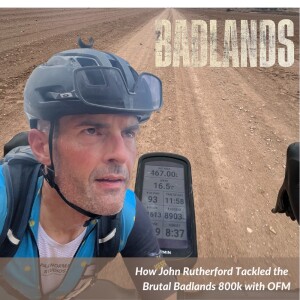
Tuesday Nov 19, 2024
73 - Vespa, OFM & Ultra Endurance Gravel Grinding: Lessons from Badlands 800K
Tuesday Nov 19, 2024
Tuesday Nov 19, 2024
Episode Summary
In this episode of the OFM Podcast, Peter Defty, Tony Konvalin, and John Rutherford discuss a variety of topics related to OFM and Human Performance in the context of John’s recent EPIC accomplishment of finishing 10th overall at the Badlands 800 Kilometer gravel bike in the Andalusian Deserts of Spain. This event has taken on legendary status in just a few short years attracting the best gravel cyclists from across the globe to challenge themselves against the terrain and elements as well as each other.
John shares his incredible experiences as an elite cyclist, Marine Corps F-18 fighter pilot, ultrarunner, IronMan Triathlete then coming back full circle to his first love of cycling culminating most recently with Badlands.
John was an early, early adopter of OFM beginning in 2010 by first using VESPA. Like so many people pursuing endurance sports John was suffering from GI issues and bonking. While VESPA made a huge difference in John’s fueling, his full adoption of OFM in the fall of 2010 has had profound long term benefits which are part of the conversation.
Key Highlights:
- John Rutherford’s Journey
- John ‘chased the dream’ of being a professional cyclist following the conventional high carb diet & fueling recommended at the time which resulted in ever increasing swings in both energy and weight which impacted his ability to perform consistently.
- Recognizing the costs associated with pursuing a career in Pro Cycling were not worth the benefits, John punched out of the USA Cycling Development Team and went to school and graduated from UC Davis then immediately into the Marine Corps to become an F-18 Pilot with multiple combat missions in Afghanistan and Iraq. During this time John’s ‘sports’ were confined to basic PT onboard an aircraft carrier or base.
- While in the Marine Corps as an F-18 pilot John was nominated and selected to become the White House Liaison to the Secretary of the Navy which seeded the bug to become a diplomat with the U.S. Department of State. It was at this point John took up endurance running which transformed into ultrarunning.
- After going all in on OFM John had several successful 100 milers before transitioning to competing in Half and Full IronMan triathlons including qualifying for and competing at the Kona IronMan World Championships. While posted in Belgrade, Serbia for the State Department during COVID John’s rekindled his love for cycling.
- His selection as the foreign service officer to NATO in Brussels, Belgium has further fuelled the cycling bug, especially gravel racing. Though he continues to run regularly for cross training, his focus since COVID has been on ultracycling events including winning the Liege-Chimay-Liege 500 Kilometer Road Cycling Event overall beating the 2nd place finishers (a 2 person Team) by over 2 hours. .
- A firsthand account of tackling the infamous Badlands 800k race, including its brutal terrain, lack of support, unrelenting heat, grueling climbs and treacherous descents…..all of this balanced by the incredible beauty, resilience, camaraderie and, ultimately, the triumph of a top ten finish.
- How John secured a top-10 finish despite zero recon or training on course, gravel specific conditioning challenges, and competing against highly prepared, supported athletes.
- The benefits of OFM: reduced calorie intake, performance, endurance, mental clarity/focus/executive function and avoiding the “gut bombs” of traditional fueling.
- John’s experience as the top fat-burner in the FASTER study and how he sustains long efforts with minimal carbs yet uses them when he needs to.
- John articulates how easy the dietary aspects of OFM are in terms of daily life due to his experience on both ends of the spectrum. Prior to VESPA and OFM, John was High Carb/Low Fat/Low Protein and after finding OFM and the publication of “The Art & Science of Low Carbohydrate Performance”, John moved to a more Keto level of carbohydrate restriction for a few years before starting to re-introduce carbohydrates back into his diet and fueling per OFM’s “Strategic Carbohydrates” protocols.
- Lessons Learned and Future Goals
- The importance of VESPA and strategic carb use for high-intensity efforts.
- The importance of event specific training, including training with gear and conditions mimicking the event one is training for.
- Balancing a demanding career with a family and ultra-endurance sports.
Discussion Topics:
- Adapting a low-carb diet for endurance sports.
- Fueling strategies for ultras: water, salt, Vespa, and strategic carbs.
- Wisdom and self-awareness gained from years of racing.
- The role of OFM in high-level performance and Metabolic Efficiency/Flexibility.
Closing Musings:
This episode showcases the transformative power of OFM for endurance athletes over the long term. John Rutherford’s journey . . .
- High Carb Pro Cyclist
- F-18 fighter pilot
- 100 Mile Ultras (where he found VESPA & OFM)
- Kona IronMan
- Winning the prestigious 500K Liege-Chimay-Liege Road Race
- 10th place Badlands 800K
. . . highlights how OFM supports a person to consistently show up and be the best version of themselves no matter what the challenges of ultra-endurance events, including Life! Remember, along with being the Foreign Service Officer for the US Department of State assigned to NATO (John reports directly to the US Ambassador to NATO & he is fluent in Russian), John has a wife and two boys.
Hopefully John’s long term OFM journey will inspire you to reassess whether the conventional wisdom of high carb dieting and fueling (which is, essentially, “too much sugar”) and whether it really makes sense while exploring how the OFM program and protocols offer a roadmap back to your native physiology and in alignment with our evolutionary heritage.
Doesn’t matter whether you're an elite athlete, age grouper or simply looking to be the best version of yourself in all aspects of life, John’s journey there are nuggets to glean for everyone including how to enjoy the ride, because, remember, whether you know it or not we are all signed up for that ultra-endurance event called Life!

Thursday Oct 17, 2024
Ultrarunner Jenny Capel on Finding Joy, Family Balance and Fat Adaptation
Thursday Oct 17, 2024
Thursday Oct 17, 2024
Peter Defty sits down with recently retired elite ultra runner, Jenny Capel, to reflect on her 22-year journey in the sport, much of it fueled by VESPA and OFM. Jenny shares personal stories about her father, Roland Martin, an early ultra running pioneer, and how she initially found running to be "stupid" before becoming one of the sport’s top competitors.
Jenny discusses her transition from a reluctant runner to an elite athlete, and how OFM (Optimized Fat Metabolism) and Vespa played crucial roles in overcoming GI issues and achieving long-term success. She talks about the importance of balancing life as a mother, physical therapist, and competitive runner, highlighting her decision to scale back from racing to start a family all while maintaining her love for the sport.
Key topics covered include:
Jenny’s Early Introduction to Ultra Running and Reluctant Start
- Jenny’s father, Roland Martin, was an early ultra running pioneer, competing alongside some of the sport’s founding figures, such as Gordy Ainsleigh, Bruce LaBelle, Wayne Miles, Dana Gard and Bill Finkbeiner..
- Despite growing up in an ultra running family, Jenny resisted the sport, only joining after college when she started dabbling in races for fitness.
- Her first competitive experience came from a 10K, where she unexpectedly placed 3rd in her age group thus sparking her interest in competitive running.
Overcoming GI Issues with Vespa and Transitioning to Fat-Adaptive Running
- Jenny was one of the early adopters of Vespa and the OFM (Optimized Fat Metabolism) protocol after experiencing severe gastrointestinal issues during races.
- Before Vespa, Jenny often found herself puking during races, a common issue among ultra endurance athletes relying heavily on carb-based fueling.
- Peter Defty guided Jenny through adjusting her diet, lowering carb intake, and using Vespa to stabilize her energy and avoid the typical mid-race crashes.
- After switching to a fat-adapted approach, Jenny noted an improvement in her energy levels, reduced calorie intake during races, and complete elimination of GI issues.
The Mental Fortitude Required for 100-Mile Races
- Jenny highlights the difference between 50-mile/100K races and 100-milers, emphasizing that the mental challenge is significantly greater.
- Between roughly the 65- to 85-mile mark, runners face what Peter calls "no man’s land"—where the body is fatigued, Circadian Rhythm disrupted making it mentally easy to quit. It is the mental fortitude to override all these signals that keeps you going.
- Jenny shares her personal experiences of battling “demons” during races, explaining that the ability to overcome these moments of vulnerability often separates successful ultra runners from those who drop.
Balancing Life as a Mother, Physical Therapist, and Competitive Ultrarunner
- After becoming a mother of two, Jenny and her husband, Steve, both physical therapists, prioritized work-life balance by cutting back on their work hours to focus on their family.
- Jenny shares how she maintained her competitive edge while raising young children, adjusting her training around family commitments.
- Despite the demands of ultra running, Jenny emphasizes that family was always her top priority, a lesson she carried from her time living in the Netherlands, where family is placed above work.
Finding Joy in Running Again After Personal Loss
- After her father’s death in 2018, Jenny questioned her relationship with running and whether racing still held meaning for her.
- She ran the Canyons Endurance Run the day after her father passed away, feeling a deep connection to him on the trails where he had introduced her to trail running.
- In a pivotal race at Bighorn, Jenny rediscovered her love for running by focusing on joy rather than competition. This experience changed her perspective, allowing her to appreciate the beauty of the trails, nature and the camaraderie of the ultra running community.
The Decision to Retire from Competitive Ultra Running
- After more than two decades of competing, Jenny decided to retire from racing after achieving her dream of running the Hardrock 100, which her father completed at the race’s inception in 1992.
- Jenny’s goal wasn’t to podium at Hardrock but to take in the experience, honor her father, and ‘Kiss the Rock’ at the finish line and have her Dad run his fastest time by carrying a photo of him from a race with her throughout the run..
- This race marked a perfect conclusion to her competitive career, where she felt at peace and in tune with the mountains, culminating in what she describes as a "spiritual experience."
How OFM has helped Jenny navigate Female Health
- At 51 Jenny is showing none of the signs of perimenopause symptoms.
- Jenny talks about her friends' experiences and hopes she doesn’t have to go through the same..
- Jenny and Peter discuss how the OFM Lifestyle of minimizing sugar intake and physical activity have wide ranging benefits for female health such as reduced inflammation, improved circulation and proper hormonal balance, all of which are critical to female reproductive health.
Embracing Life After Racing and Continuing to Run for Fun
- Jenny still runs regularly but focuses on enjoying the process, often exploring new trails and embarking on adventure runs without the pressure of competition.
- She shares a memorable day run on the Ruby Crest Trail with a friend, highlighting the joy of running for the pure love of nature and adventure.
- Looking forward, Jenny plans to remain active, exploring trails and maintaining her fitness without the intensity of race training, all while incorporating new activities like yoga, golf and spending more time with her family.
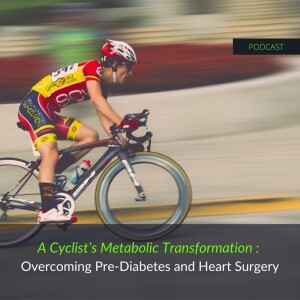
Wednesday Sep 25, 2024
Wednesday Sep 25, 2024
Dustin Armstrong, a Cat 1 Cyclist joins us to share his metabolic transformation via OFM. Starting Life with underdeveloped lungs racing helped him develop his engine. However, following the conventional approach to sports nutrition Dustin became pre-diabetic and eventually developed heart disease.
He’s defied the odds through the OFM (Optimized Fat Metabolism) approach. Tune in as Dustin and Peter discuss the highs and lows of Dustin's athletic career, his unique insights into metabolic health, and how the OFM protocol has helped him achieve optimal performance and health.
Talking Points:
Introduction to Dustin Armstrong:
- Born with underdeveloped lungs and faced significant health challenges from the start.
- Transitioned from professional BMX racing to road biking at the age of 28.
The Shift to Road Racing:
- Journey from Cat 5 to Cat 1 in just one year.
- Initial experiences with different nutritional approaches, including raw veganism and paleo diets for athletes.
Discovering OFM and Ketogenic Diet:
- Struggled with inflammation and a pre-diabetic diagnosis in 2015.
- How the initial adoption of a ketogenic diet helped manage his blood sugar levels but resulted in losing the top-end power necessary for road racing.
- Introduction to the OFM and VESPA through Peter Defty’s brother and its impact on his performance and health.
Experiences with Ketone Esters:
- Early experimentation with high-dose ketone esters and their effect on athletic performance and recovery.
- Challenges and learning to use ketone esters for recovery rather than as a direct performance enhancer.
- Ketone esters, like those developed by Frank Llosa at KetoneAid, are highlighted as a powerful tool for sustained energy and mental clarity during extended athletic efforts.
- Dustin discusses how a microdosing ketone esters can help him stay strong while others are fading.
Heart Surgery and Recovery:
- Diagnosis of a bicuspid valve and aortic enlargement requiring emergency surgery.
- Post-surgery recovery using a strict keto diet, nutrient-dense foods, and gradually including ‘Strategic’ carbs to be able to return to competition per the OFM protocols.
- Remarkable comeback within six months, completing multiple challenging events.
The Role of Nutrition and OFM in Athletic Success
- How Dustin optimized his fueling strategy with Vespa, strategic carbs, and ketone esters.
- Importance of nutrient-dense foods like raw milk, homemade yogurt, Natto and other fermented foods for gut health.
- Utilizing ancestral health principles to enhance performance and recovery.
Current Racing and Training Insights:
- Competing in criterium races every weekend and managing a balanced diet with strategic carbohydrate intake.
- Experimentation with different fueling strategies, including the use of raw milk post-race for recovery.
- Managing non-native-EMF exposure and other environmental exposures with a holistic Lifestyle approach to achieve both optimal health and performance.
Strategic Carbohydrate Use:
- Dustin shares how he strategically incorporates carbohydrates to boost performance, especially during high-intensity efforts or long endurance rides.
- He emphasizes that a little goes a long way when your body is fully fat-adapted.
Holistic Recovery Approach:
- Dustin attributes his rapid recovery from heart surgery to a nutrient-dense diet, the strategic use of OFM, and ketone esters.
- He emphasizes the role of a balanced gut microbiome and reduced exposure to non-native EMF in optimizing recovery and health.
Personal Anecdotes and Success Stories:
- From his own experience overcoming a congenital heart defect to helping others through OFM, Dustin illustrates the transformative power of OFM.
- He mentions mentoring a friend who has achieved significant marathon performance improvements using a combination of keto, OFM, and Vespa.
Balancing Modern Nutrition Trends:
- Peter and Dustin discuss the current high-carb fueling trends in endurance sports and the pitfalls of extreme carbohydrate dependence.
- They advocate for a balanced, context-specific approach that leverages fat adaptation for sustainable performance and health so athletes can take full advantage of ‘Strategic’ Carbohydrate use during high level training and competition to minimize the negative health impacts of glycolysis while maximizing the performance gains.
Your health and performance is not about following a one-size-fits-all approach but an individualized one that factors in your specific variables, including the demands of the sport. OFM addresses how our native metabolic pathways can be leveraged in real world ways to achieve “Higher Health & Peak Performance” . Justin is another example of how important addressing performance at the metabolic level is toward achieving your health and performance goals. More so, OFM is about fully living LIfe!
This conversation provides valuable insights on how you can reduce your sugar consumption, while, at the same time, dramatically improving health and longevity without any sacrifice in performance . . . you probably will see significant improvement with time.
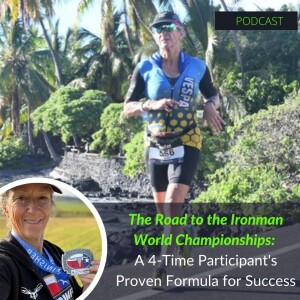
Wednesday Sep 04, 2024
Wednesday Sep 04, 2024
Marty Smith is heading to Nice in a week to compete at the IronMan World Championships in the 65-69 Age Group. This is not her first rodeo. Marty has participated in 4 IronMan World Championships, including last year. She has also qualified for and competed in 2 IronMan 70.3 World Championships. Her slowest full IronMan time was 14:52 in her first World Championship in 2013, over a decade ago and before discovering VESPA and the VESPA developed OFM Protocols.
Like all our stories, Marty’s road to the World Championships is so much more than all things triathlon. Marty shares her incredible journey of recovery, her transition from addiction to athleticism, and how embracing OFM and using VESPA have been game-changers for her performance and longevity in endurance sports.
Discussion Points:
Marty’s Background: Overcoming Addiction through Athleticism
- Marty shares her personal story of addiction beginning with food addiction at a young age then segueing into alcohol and drug addiction in adolescence and adulthood.
- Her recovery journey began 33 years ago, and she describes how she replaced unhealthy habits with positive ones, including endurance sports.
Introduction to Endurance Sports
- How Marty transitioned from a sedentary lifestyle to an active one.
- Her late start in athletics, beginning with running in her 40s, and eventually qualifying for and competing in the Boston Marathon and multiple Ironman events.
The Role of Diet and Nutrition:
- Marty discusses how her shift to OFM, by timing the balance of carbohydrate restriction with “Strategic” Carbs and using VESPA, allowed her to make the fundamental shift back to using body fat as fuel
- How this fundamental shift to body fat as the principal aerobic energy source significantly improved her athletic performance and overall health.
- Insights into her pre-race and race-day nutrition, including the use of Vespa and “Strategic” Carbohydrates during competitions.
Marty’s Ironman Success:
- Competing in 10 Ironmans, including three appearances at the Kona World Championships and now heading to Nice.
- Overcoming challenges like injuries and personal loss, including her experience of racing shortly after her mother's passing. This includes how the physiological stability OFM provides helps with coping and moving forward in spite of the challenges Life presents.
Training and Recovery Insights:
- How Marty maintains high levels of training and performance without traditional rest days.
- Her approach to recovery, including the impact of OFM on reducing recovery time and improving race-day performance.
Living Life on Her Terms:
- Marty reflects on her experiences as a nurse which culminated in hospice care.
- How the combination of her professional career combined with her OFM journey has shaped her views on health and aging.
- How Lifestyle choices most people unknowingly make lead to chronic disease and mobility issues.
- The importance of maintaining an active lifestyle as a key to longevity and quality of life.
Advice for Aspiring Athletes:
- Marty emphasizes that it's never too late to start living a healthier, more active life.
- Tips for incorporating OFM into your life and sport. This includes the benefits for athletes of all levels.
- At 66 years young and fit Marty’s message in this podcast are in alignment with how she lives her life.
Marty Smith is another powerful example of how it's possible to not only turn your life around at any age but achieve the extraordinary. Her journey from addiction to becoming a top competitor in her age group at Ironman events inspires and educates. . . and, as discussed in the podcast, it begins with getting down to the basics. One of those basics is your foundational physiology which is precisely what the OFM Metabolic Reset does; re-establish your native metabolism which uses body fat as the primary aerobic energy source.
This episode is not just for Triathletes. For anyone seriously considering making positive lifestyle changes this podcast is a must listen because Marty’s journey can be anyone’s journey. Please share with your friends and family.

Wednesday Aug 28, 2024
69. Kate Hubber’s Metabolic Health Journey: From Falling Pregnant To Racing
Wednesday Aug 28, 2024
Wednesday Aug 28, 2024
As I like to say, “Whether everyone knows it or not, we are all signed up for that ultra-endurance event called Life.” Kate Hubber’s OFM journey demonstrates how one can successfully navigate the complexities of modern life by being grounded in the foundational physiology OFM.
Kate originally came to us seeking to use OFM and VESPA as a means to improve her half marathon, marathon and ultramarathon running as she was starting to experience all the typical challenges most runners face of energy swings, bonking, GI issues and weight gain as she entered her thirties.
She got much more than she bargained for because within months of making the fundamental metabolic shift she fell pregnant with her first child. Prior to making the switch to OFM she had not been able to conceive.
Not only has Kate been able to successfully juggle the demands of being a mum to two young children, a husband and full-time career as an environmental engineer but continues to smash her athletic performance goal. All with aplomb, a sense of humor and positivity. This is what happens when your foundational physiology shifts from the constant “fight of flight” physiology of being glucose dependent to the blood sugar stability of OFM.
Podcast Synopsis:
Introduction
- Kate discusses her background, including her competitive sailing career, transition to running, the challenges she eventually faced as a consequence of the conventional approach of high carb diet and fueling which brought her to OFM.
- How Kate started her OFM journey and the dramatic impact it had on her life, including how she fell pregnant after previously assuming she couldn’t have children.
The OFM Transformation
- Kate shares her experience transitioning from a conventional high-carb diet to a carb restricted, fat-adapted lifestyle and the positive changes it brought.
- The challenges and rewards of maintaining this lifestyle while balancing a career, family and her athletic and health goals.
- How OFM helps her maintain energy, focus, and endurance, even with the added responsibilities of motherhood.
Running and Endurance
- Kate talks about her experience running ultra-marathons and how OFM has enhanced her performance.
- The psychological and physical benefits of being fat-adapted during long runs and endurance events.
- Kate’s preparations for an upcoming 100k trail race and the use of Vespa and strategic carbs in her fueling
Balancing Life and Health
- Strategies Kate uses to juggle her running, work, kiddos and family life.
- The importance of curiosity and questioning conventional health advice.
- Kate’s approach to nutrition and how she incorporates OFM principles into her daily routine and for her family
Health, Mindset, and Longevity:
- The broader implications of metabolic health for long-term wellness.
- The role of mindset in overcoming challenges and staying motivated and how being ‘Blood Sugar Stable” via OFM supports a positive and motivated mindset.
- Kate’s reflections on setting a healthy example for her children and navigating social pressures around food and lifestyle choices.
Practical Advice and Tips:
- Kate’s tips for anyone looking to start their own OFM journey or improve their endurance training.
- The importance of individualizing your approach to health and fitness which is the “Last Mile” of the OFM journey.
The episode wraps up with a discussion on the importance of finding your unique path in health and fitness, and how OFM and VESPA can be powerful tools toward achieving balance, performance, and longevity.

